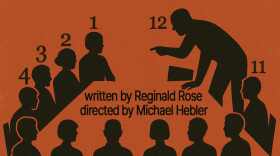AUDIE CORNISH, HOST:
Now the story of a family reunited. They're originally from Yemen, and the Trump administration's travel ban had separated the parents from the children. The mother and father were back in Djibouti while their children were here in the U.S. NPR's Leila Fadel saw them brought back together this week.
LEILA FADEL, BYLINE: Ahlam Alsoufi drops to her knees in tears in baggage claim at the Detroit Metro Airport. She opened her arms, and her 3-year-old son, Muslim, rushes into them and hugs tight.
MUSLIM: (Speaking Arabic).
AHLAM ALSOUFI: (Speaking Arabic).
FADEL: Did you bring me a present, he asks his mom in Arabic. Her three other children wait to be enveloped in their parents' arms.
MOHAMED MOHSIN: (Speaking Arabic).
ALSOUFI: (Speaking Arabic).
FADEL: Ahlam's husband, Mohamed Mohsin, leans down to kiss his children. How are you, my loves, he says. It's been a long trip home.
MOHSIN: Two days, I didn't sleep. But wallah when I see them, I forget.
FADEL: Mohamed Mohsin is a Yemeni American truck driver. He was in the final stages of bringing his family to the United States when President Trump started blocking travel from several majority Muslim countries, including Yemen, which is still on that list today. His four children got their visas, his wife did not. They were waiting in Djibouti because the embassy in war-torn Yemen is closed.
And so he was faced with an impossible choice - leave his wife alone in a foreign country with no one or send his children, the oldest just 10 at the time, to the United States alone before their visas ran out. He sent the kids ahead. They stayed behind. That was over a year ago. Shortly after their story aired on NPR, the embassy in Djibouti emailed, and Mohsin's wife's visa was issued. This week, They arrived in Michigan.
MOHSIN: So happy, me and my wife - so happy. Believe me, I forget everything. You know, in Djibouti - you didn't know Djibouti - so hot, expensive, problem, plus no kids, plus ban. Almost crazy. But today, I'm so happy.
FADEL: His eldest daughter, Sara, now 12, stands nearby, first looking up at her dad in awe and then looking at her mother also in disbelief.
SARA: Yeah, so happy. I think this is not real.
FADEL: It's not real?
SARA: No.
FADEL: It feels not real?
SARA: No, it's not real.
FADEL: The 12-year-old has been the de facto mom to her younger brothers. For months, her parents promised that the visa would be printed and they'd be together in a couple of weeks. But weeks would pass, and they wouldn't come. So when they're finally standing in front of her, she says it's hard to believe it's real.
SARA: This is my best day.
FADEL: Her mother, Ahlam Alsoufi, pulls Sara into her lap and hugs her. She tells her how proud she is of her.
ALSOUFI: (Speaking Arabic).
FADEL: These were the hardest days I've lived in my life, especially when my kids left, Alsoufi says. She holds her daughter tight. They're together now. The kids are different, bigger, especially the youngest. They pull six suitcases from baggage claim and set out to restart life in the United States together.
But the future, Mohamed Mohsin says, will be difficult. He's tens of thousands of dollars in debt. He hasn't worked in nearly two years, when he first set out to bring his family from Yemen. His house is gone. He sold his car, his truck - all to support his family.
MOHSIN: I'm looking for any job, any job because I have to take care of them. I have to cover my loan. I have a lot of problems.
FADEL: But today, he won't think about all those problems. Today, he says, he knows he's one of the lucky ones. Scores of other families are still divided by the travel ban. Today, he'll enjoy his children. Leila Fadel, NPR News, Detroit. Transcript provided by NPR, Copyright NPR.








